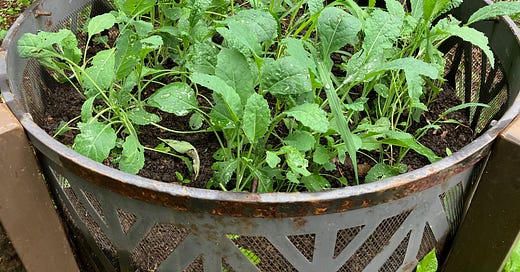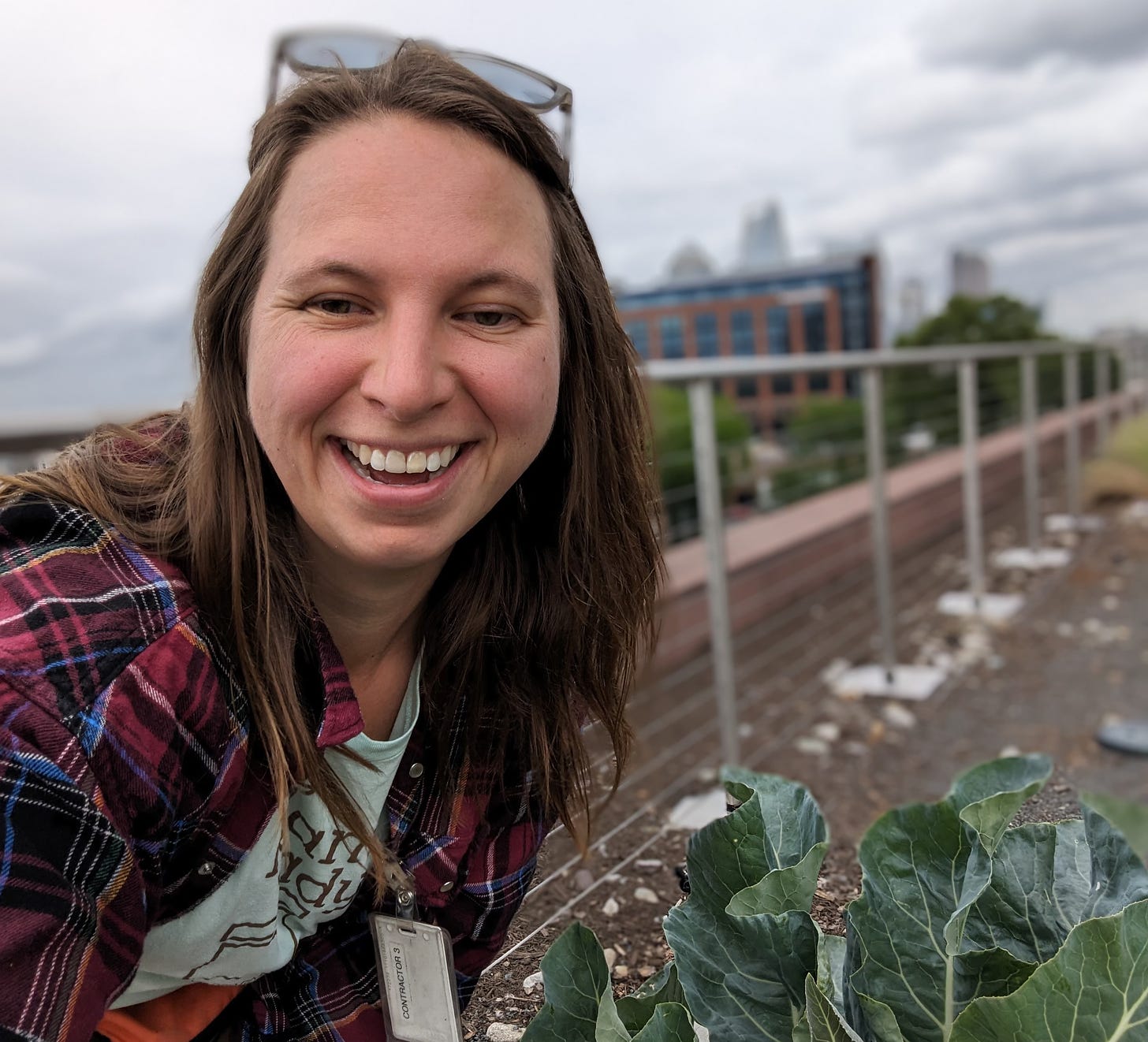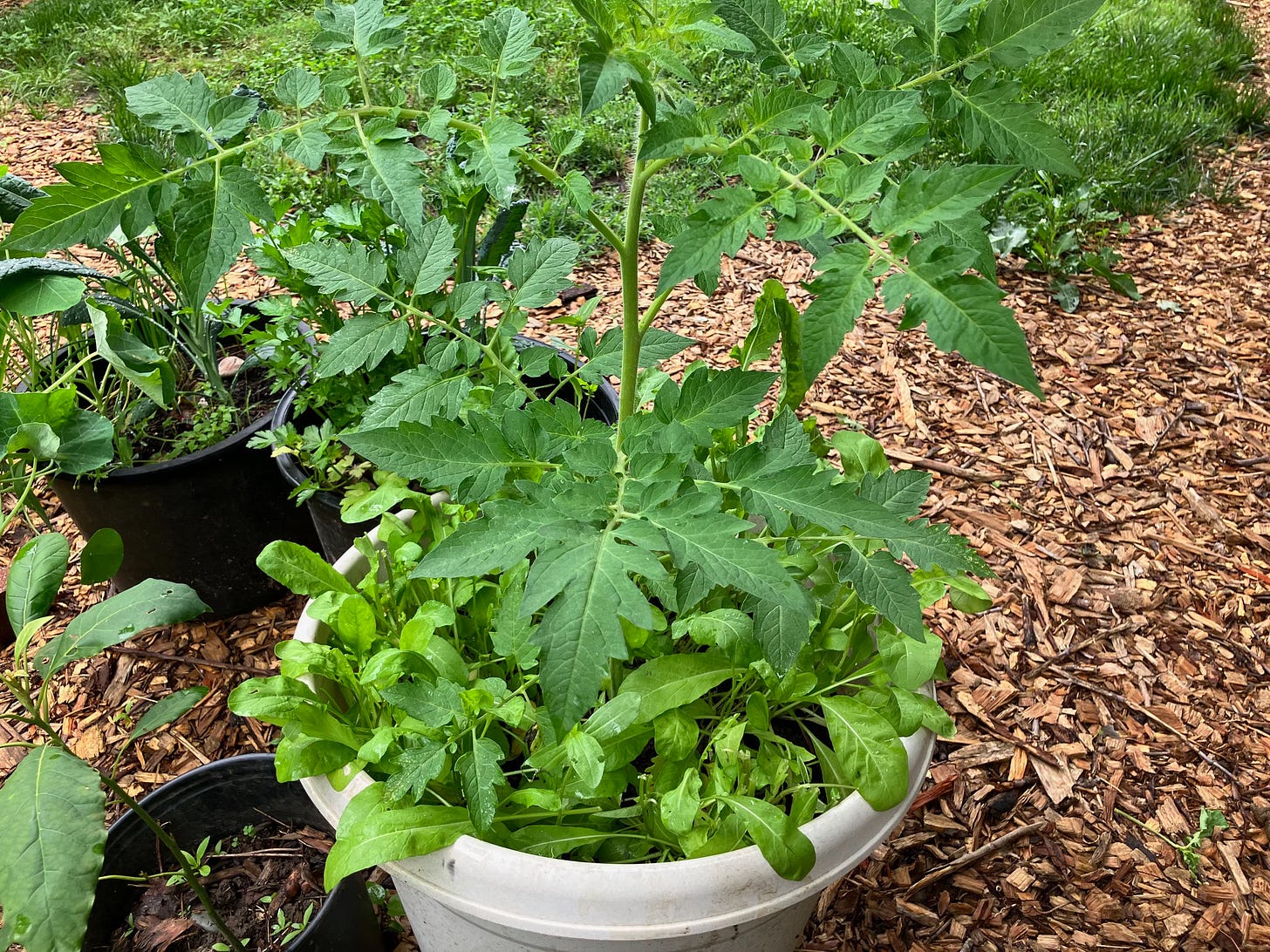Charlotte embraces small space gardens
Plus: The news of the week — UNC Chapel Hill cuts DEI funding; Charlotte CEOs get big raises; Autobell Car Wash tests automation; Apartment gyms bulk up
Good morning! Today is Saturday, May 18, 2024. You’re reading The Charlotte Ledger’s Weekend Edition.
Need to subscribe — or upgrade your Ledger e-newsletter subscription? Details here.
Today's Charlotte Ledger is sponsored by VIA Health Partners, formerly Hospice & Palliative Care Charlotte Region. New name, same exceptional care for families in 32 counties across North and South Carolina.
Backyard & Beyond: From patio peppers to balcony tomatoes, urban gardeners embrace container gardening
Spring makes even non-gardeners dream of growing things. That’s the thinking behind Backyard & Beyond, our occasional series of stories giving you ideas and inspiration. Whether you long to grow some of your own food, ditch your cookie-cutter landscaping or just make your yard more welcoming, we’re here for you!
by Amber Veverka
For some Charlotte residents, plant-filled aisles currently at garden centers might be a bitter sight.
True, the scented mint leaves summon thoughts of mojitos, the tomato plants stir longings for BLTs. But what if you have little or no space for a vegetable garden? How do you get your yard-to-fork fix then?
Good news: There’s a world out there of container gardening that can be more bountiful than you might think. Local gardeners have tips on growing food in small spaces, whether it’s a tiny, raised bed box in a yard, a pot on a patio or a bucket on a balcony.
Think vertical
Small spaces — balconies, front steps, patios, decks, driveways — can be places to squeeze in a few pots of edible plants. Plants that produce a “fruit” — an edible part that starts with a flower — need about six hours of sun a day. (You can get away with less for some plants, such as strawberries, and we’ll mention other low-light picks below.)
Peppers, especially hot peppers, are ideal container crops, said Erin Hostetler, a longtime grower who now runs The Patio Farmer, a consulting business that helps individuals and businesses grow food. “Peppers are great for beginners. (They) don’t have nearly as many pests or disease issues as tomatoes do,” said Hostetler. “Deer, bunnies, squirrels — they don’t like hot peppers.”
Erin Hostetler, owner of The Patio Farmer. (Photo courtesy Erin Hostetler)
Hostetler teaches clients to make use of the space above their space. “Using vertical space is a great solution to maximizing your space,” she said. “I love using hanging baskets or repurposing a pallet to turn into a vertical planter. You can also purchase vertical planters or ‘veggie towers,’ which allow you to plant many plants in a small footprint.”
Robin Emmons knows a thing or two about growing food in an urban setting. As the founder of her former organization, Sow Much Good, Emmons and an army of volunteers captured national attention by growing for low-income communities. Today she’s active in food sovereignty and environmental sustainability through speaking engagements and service on the board of OneGreenThing.
Some of Emmons’ picks for easy gardening include Boston lettuce, spinach and peas (snap and sugar peas are especially prolific) — and all of those do well in pots, with a trellis or other climbing structure for the peas. Boston lettuce is expensive in the store and nearly always comes encased in a plastic box, so any you grow on your own avoids that. As with all greens, the spinach and lettuce are OK with less sun than most plants.
All plants in pots need high-quality soil, which means more than the lightweight “topsoil” that is typically at garden centers. To give high-quality potting soil life and heft, mix in some compost, homemade or purchased. Make sure the containers have holes for drainage and stay on top of watering, especially for clay pots. Slugs may seek out your salad greens. A plastic container sunk into the soil and filled with beer will draw them and drown them.
If you plant tomatoes, choose a very large pot and go for a determinate variety tomato (read the label), which is one that stops growing at three to four feet and sets fruit at one time instead of over the whole season. Push a tomato cage or very sturdy stake into the ground the day you plant it, so you don’t damage roots later from a growing plant. The deeper you plant the tomato, the more roots it will develop. As it grows, pinch off low leaves to avoid soil-borne diseases splashing up on the plant when it rains. Tomatoes, like peppers, need a lot of sunlight. If you have a tiny space or limited light, consider a pot on wheels or in a wagon, so you can wheel around your plants to follow the sun.
Save space by underplanting. Here, a tomato shares a pot with arugula. (Photo courtesy Amber Veverka)
Hostetler also recommends radishes, faster growers that tolerate some shade and which you can plant in waves for a continual harvest. Plant these soon; they do better before the weather gets really hot. Some seed companies sell mix packets, which include red, pink and purple varieties. Tim Turton, horticulture supervisor with Mecklenburg County, favors the heirloom variety white icicle, a particularly spicy radish that he grows in a garden box.
Perennial herbs such as thyme and sage enjoy container life, and neither wants to be wet, so they’ll forgive you when you forget to water. “Perennial herbs are super hardy and resilient,” Hostetler said.
Other container plant picks:
Mints. Even if you have a sprawling, in-ground garden, you’ll want to corral mint in a pot. It spreads so fast and is so hard to eradicate it can practically sneak into your windows and strangle you in your sleep. Peppermint has small, dark-green leaves and spearmint has longer, lighter leaves. All mints may look a little scraggly by late summer, but you can shift your pots around and hide them behind something prettier. Tip: The Celtic Frost Herb Farm at the Charlotte Regional Farmers Market has a great selection of unusual mints, including chocolate and apple. Note: Pregnant women should not consume pennyroyal, a member of the mint family that can cause uterine contractions.
Green onions. Remember how during the pandemic, everybody was rooting the bottoms of store-bought scallions in water? Some of us never quit. But instead of using water, just push the root ends into the dirt of your other pots and as they grow, snip the tops for recipes. These will take some shade.
Eggplants. Eggplants adore heat, so they may like the warmed-up soil of a pot better than the ground. The long Asian varieties seem to grow better here than the traditional globe types.
Potatoes. There’s still time to plant potatoes, which can be true seed potatoes or in a pinch, supermarket or farmers market potatoes that have already sprouted (if they don’t sprout, chances are they’ve been treated to prevent that). Bury the potato in soil in a deep pot, bin or fabric bag — even a trash can drilled with drain holes. Don’t fill the container up with soil. Instead, as the plant grows taller, bury the stalk up to the top leaves with loose soil — a process called “hilling.” Keep doing that as the plant grows until you get to the top of the container. This allows more potatoes to form underground. When the leaves die back, tip the container over to discover your potatoes. Tip: Don’t overfertilize the soil or you’ll have great leaves and no potatoes.
Advice for apartment-dwellers
What if you truly have zero outdoor space? You have a few edible plant choices for indoors, in a sunny window. “There are small footprint hydroponic towers you can grow food in,” Hostetler said. “There are microgreens. Even mushrooms, which you can grow in a controlled environment.”
To maximize your chances of producing food in an apartment or townhome setting, Hostetler also offered advice.
“If you are a plant person and you’re looking for an apartment, you want one on the south-facing side of the building that doesn’t have trees in front of the building or balcony,” she said.
Unlike so many other hobbies, gardening is a low-risk endeavor — so the important thing is to just get started.
“A packet of seeds is a small investment,” Emmons said, “and I, myself, learned a ton after multiple failures that ultimately served to teach me valuable lessons that increased my harvests substantially over time. There’s no downside to it. It is a wonderful activity that has multiple benefits for families’ well-being, physical and mental health, and of course, it supports the planet, too!”
An old firepit makes a container for young kale and lemongrass. (Photo courtesy Amber Veverka)
Box it up
If you’ve got room for a little raised bed, you can make a garden box out of almost anything. If money is no object, you can build (or buy) one out of cedar, which will be rot-resistant and last ages.
But don’t turn gardening into a money pit. Your vegetables do not care what their container looks like and if you plant it full enough, with something cascading around the edges (such as nasturtiums, which have bright orange and yellow edible flowers and whose leaves are a spicy addition to salads), the box will soon be camouflaged by greenery anyway.
Low-cost beds can be constructed from concrete blocks, stacked pallets (some experts say ideally you want those marked “HT” for “heat-treated,” so you avoid chemically treated wood), or even downed logs. Stores sell rectangular fabric containers that are porous. You’re just looking for something to contain the soil, especially during heavy rain. You can line the bottom of DIY boxes with hardware cloth (metal mesh with small holes) to keep voles and chipmunks from burrowing up, or you can take your chances.
Two things I’ve tried and regretted: Plastic bins made for indoor storage and galvanized metal, both with holes drilled in their bottoms and sides. The sunlight broke the bins down after a couple of years, resulting in shards of plastic all through the soil. The zinc coating on the galvanized metal is supposed to be safe unless acid breaks it down. What I found was that plants in those metal containers turned yellowish and did not thrive. Was the soil I shoveled in too acidic? Did the metal heat up too much? I’m not sure, but I gave up on the cool-looking washtubs.
➡️ Do you have creative containers for your garden plants? We’d love to see photos and hear about what works for you. Contact askbackyard@gmail.com
It’s time for …
Planting sweet potatoes. If you have the space, sweet potatoes are one of the most hands-off crops you can grow. They’re underground, doing their thing, safe from most pests and diseases, and their vines crowd out weeds. Garden centers and hardware stores sell sweet potato slips for planting.
Trimming the spent stalks of irises. Once your irises are done blooming, cut back the flower stalks at the base. Leave the swordlike foliage, which feeds the plant.
Getting expert garden help. On Saturday, May 25, 8 a.m. to noon, Extension Master Gardener volunteers will be on hand at the Matthews Community Farmers Market to answer your home gardening questions. Address: 188 N. Trade St, Matthews.
Learning while you lunch. Check out videos from the North Carolina Native Plant Society and get great tips on welcoming nature — and native plants — into your yard.
Reach Amber Veverka at askbackyard@gmail.com.
Today’s supporting sponsor is VIA Health Partners, formerly Hospice & Palliative Care Charlotte Region. New name, same exceptional care for families in 32 counties across North and South Carolina.
This week in Charlotte: Low-turnout runoff finalizes November ballot; County proposes tax increase; United Way CEO becomes president of Foundation for the Carolinas; Hornets name new business executive
On Saturdays, The Ledger sifts through the local news of the week and links to the top articles — even if they appeared somewhere else. We’ll help you get caught up. That’s what Saturdays are for.
Education
CMS mulls school calendar alternatives: (WFAE) Charlotte-Mecklenburg school board members are examining alternative schedules in future years, including year-round schools, longer instructional days and four-day weeks, in an attempt to finish the fall semester’s classes before the December break while also following the state law that doesn’t permit starting before the end of August.
UNC Chapel Hill cuts DEI funding: (AP) UNC Chapel Hill’s board of trustees voted to cut $2.3M of spending on diversity programs and redirect the money to public safety and policing. Students protested the move during a board of trustees committee meeting later in the week.
Politics
School voucher funding: (WUNC) With North Carolina’s budget surplus coming in lower than expected, state lawmakers are trying to find other avenues for funding a private school voucher program.
Lieutenant governor race set: The race for lieutenant governor will have plenty of Mecklenburg ties, as Hal Weatherman, the former chief of staff to U.S. Rep. Sue Myrick of Charlotte, won the Republican primary runoff on Tuesday and will face Democratic state Sen. Rachel Hunt of Mecklenburg in November. Former prosecutor Dave Boliek won the Republican runoff for auditor in a low-turnout election.
Local news
Proposed county budget includes tax increase: (Ledger) Mecklenburg County’s proposed $2.5B budget for 2024-2025 raises taxes by $57 a year on a median-priced $383,000 house. The budget boosts county spending by $130M to pay for a variety of initiatives on health, homelessness, education and the environment. County manager Dena Diorio said the tax hike is necessary due in part to the cooling local economy, which has led to slower growth in tax revenues.
Pineville changes substation site: (Observer) The Pineville Town Council voted Tuesday to move the location of a controversial electrical substation that was planned to be built along the town’s border with South Carolina. The owner of the land where the substation was slated to be built filed a lawsuit last month against the town, and residents of a nearby neighborhood had also objected. The new location is expected to be on a site on Nations Ford Road.
Business
New Foundation for the Carolinas president: (Biz Journal) Foundation for the Carolinas, one of the largest community foundations in the U.S., has hired United Way of Greater Charlotte CEO Laura Yates Clark to be its new president.
What the big boss makes: (Ledger 🔒) A Charlotte Ledger analysis of CEO pay data of 25 large and notable Charlotte-area public companies shows that the median increase in compensation of top execs was 13% in 2023, compared with their pay a year earlier. And for the first time, a majority of local CEOS had pay packages of $10M or more.
Sports
Guten tag: The Carolina Panthers will play in Munich, Germany, on Nov. 10 versus the New York Giants, the NFL announced Wednesday morning.
New Hornets business leader: Hornets Sports & Entertainment announced the hiring of Shelly Cayette-Weston as the team’s president of business operations, replacing longtime team executive Fred Whitfield. She spent 12 years in business roles with the Cleveland Cavaliers.
Don’t miss these Ledger stories from this week…
The rise of freestanding ERs: Hospital systems are building freestanding emergency rooms, which are expanding care to fast-growing areas. But critics wonder whether the convenience is worth the escalating costs and confusion they can create for patients. This Ledger in-depth article also includes a guide to seeking after-hours medical care.
Tuesday (🔒)
Ways of Life: Danny Carver was an exceptional athlete and family man who had a competitive nature and a loving heart for his wife and stepchildren.
Wednesday (🔒)
Bulking up the apartment gym: Apartment gyms are getting pumped-up with high-tech and high-intensity equipment, mural walls and bigger spaces. Developers are pouring more money into gyms these days to attract and retain residents, many of whom are used to off-the-charts gyms from their college days and are seeking high-end workout spaces close to home.
Plus: Mecklenburg’s district attorney says he needs more prosecutors from the state; The latest edition of commercial real estate column ‘Whispers’; The winners of two Republican primary runoff elections; Latest Charlotte Ledger Podcast episode features a real estate lawyer who became a brewery co-founder.
Transit Time: Local governments and bike advocates want to change a decades-old North Carolina law that says state funds can only go to such efforts if they’re part of projects that benefit drivers.
Friday (🔒)
CEO pay: Check out how much the CEOs of 25 of Charlotte’s biggest companies made last year, with context and analysis on how whether pay has gone up or down, and what it means.
Plus: Charlotte-based Autobell Car Wash tests out an automated system for customers; Mecklenburg County manager says the county’s economy has ‘clearly slowed’; Foundation for the Carolinas hires United Way of Greater Charlotte CEO as its next president.
Need to sign up for this e-newsletter? We offer a free version, as well as paid memberships for full access to all 4 of our local newsletters:
➡️ Opt in or out of different newsletters on your “My Account” page.
➡️ Learn more about The Charlotte Ledger
The Charlotte Ledger is a locally owned media company that delivers smart and essential news through e-newsletters and on a website. We strive for fairness and accuracy and will correct all known errors. The content reflects the independent editorial judgment of The Charlotte Ledger. Any advertising, paid marketing, or sponsored content will be clearly labeled.
Like what we are doing? Feel free to forward this along and to tell a friend.
Sponsorship information/customer service: email support@cltledger.com.
Executive editor: Tony Mecia; Managing editor: Cristina Bolling; Staff writer: Lindsey Banks; Business manager: Brie Chrisman, BC Creative








